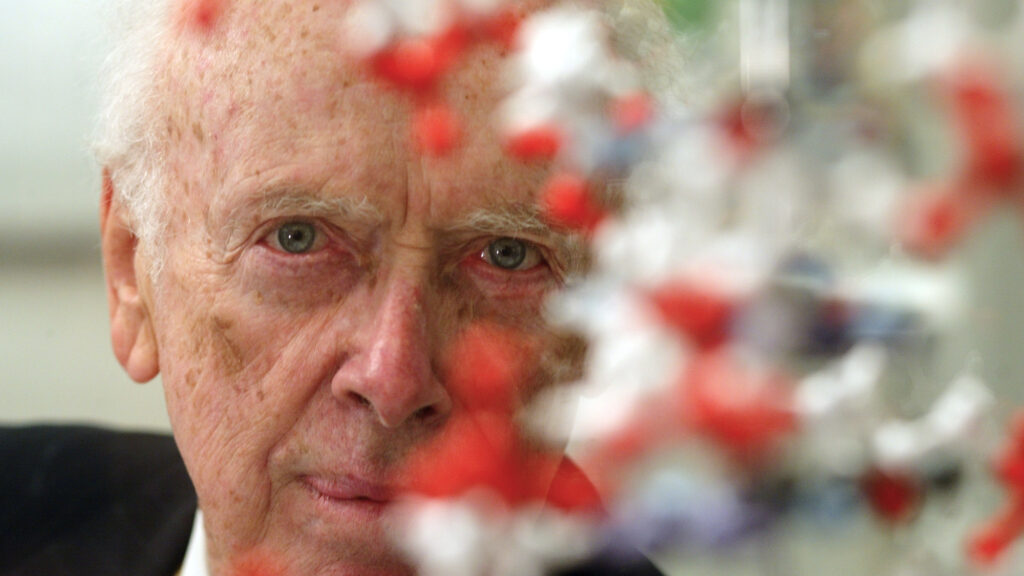When biologist James Watson died on October 19, 2023, at the age of 97, it marked a significant moment in the history of science. Watson, renowned for co-discovering the structure of DNA alongside Francis Crick in 1953, was a pivotal figure in 20th-century biology. His death signifies the end of an era that has been described as the “eighth day of creation,” a phrase reflecting the monumental impact of his work on understanding heredity and life itself.
Watson’s legacy is multifaceted. He was instrumental in transforming Harvard University‘s biology department in the 1970s, shifting its focus toward molecular biology. He also led Cold Spring Harbor Laboratory from 1968 to 2007, turning it into a leading institution for genetics and cancer research. His role as the first director of the Human Genome Project from 1990 further underscored his influence in the field. Despite his groundbreaking contributions, Watson’s later life was marred by controversial views that alienated many of his peers.
The complexities of Watson’s character are evident in interviews with those who knew him well. Many express confusion and disappointment over his public statements, particularly those reflecting a racist and sexist worldview. In a 2007 interview with a British newspaper, Watson expressed pessimism about the intellectual potential of people from Africa, asserting that “all the testing says not really” when discussing intelligence. His remarks were not isolated incidents; they echoed sentiments found in his memoir, “Avoid Boring People: Lessons from a Life in Science,” where he questioned the equality of intellectual capacities among different populations.
Watson’s views on women in science were similarly controversial. He suggested that biological differences could explain the underrepresentation of women in scientific fields, a stance that drew ire from many in the community. Friends, such as Nancy Hopkins from the Massachusetts Institute of Technology, described their bafflement at Watson’s transformation from a supportive ally to someone who embraced politically incorrect views. “At a time when almost no men supported women, he insisted I get a Ph.D. and made it possible for me to do so,” she recalled.
Despite his scientific accolades, Watson’s later years were characterized by a growing isolation. Universities and institutions distanced themselves from him, canceling speaking engagements and severing ties. His reputation deteriorated as he continued to express views deemed unacceptable by contemporary standards. In private conversations, he reportedly maintained a belief in the superiority of his ideas, often dismissing the views of experts in the field.
Watson’s rise to prominence came early in his career, with his discovery of the double helix structure of DNA at just 25 years old. Yet, as he aged, some colleagues began to question whether his success was a product of luck rather than skill. The late Ernst Mayr, a prominent evolutionary biologist, noted that Watson had not made significant contributions after his initial triumph, stating, “Except for this luck he had with the double helix, he was a total failure!”
His later engagement with controversial works like The Bell Curve, published in 1994, further alienated him from the scientific community. The book proposed a genetic basis for intelligence, a theory widely criticized and discredited. Watson, however, embraced its arguments, believing that his understanding of genetics could explain societal disparities. Friends noted that his hubris led him to disregard empirical research, favoring his intuition over established scientific consensus.
The culmination of Watson’s controversial views came in a 2019 PBS interview, where he reiterated his stance on race and intelligence, saying, “Not at all. I would like for them to have changed.” Following this interview, Cold Spring Harbor Laboratory cut all remaining ties with him, citing his “unsubstantiated and reckless” remarks. This decision marked a dramatic fall from grace for a man once celebrated as a scientific hero.
As Watson’s life came to an end, reflections on his legacy reveal a complicated portrait. He was a pioneer who reshaped the landscape of biology but also a figure whose later beliefs have overshadowed his scientific achievements. Friends and colleagues are left to grapple with the disconnect between Watson’s groundbreaking contributions and his controversial public persona.
Strong opinions persist about how history will judge Watson. While he undoubtedly played a crucial role in advancing biological science, his later years were defined by a refusal to adapt to the evolving values of society. For many, Watson’s story serves as a reminder of the complexities that often accompany genius and the potential for personal beliefs to impact professional legacies.
